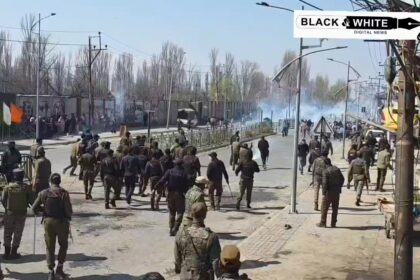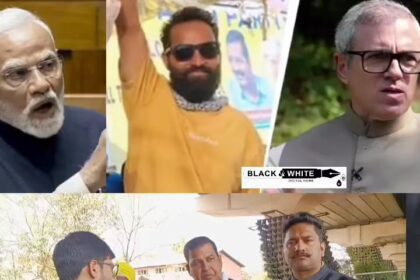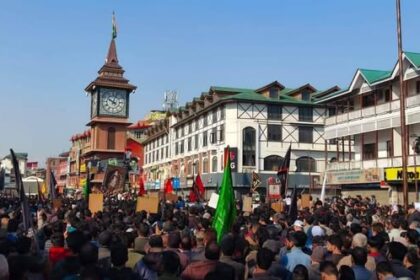Viral Video Sparks Debate on Forest Rights and Treatment of Nomadic Communities in Jammu and Kashmir
||Black and White Digital News ||
||January 31,2025 ||
A recent video circulating on social media has ignited discussions about the treatment of nomadic communities in Jammu and Kashmir (J&K) and the implementation of the Forest Rights Act (FRA) in the region. The footage depicts a forest guard confiscating a handmade tool, locally known as “Darat,” used by nomads for cutting tree bushes. The incident occurs roadside, where a nomad is seen with his sheep and goats.
In the video, an individual from the same community vocally condemns the forest guard’s actions, alleging the use of abusive language towards the shepherd. He directs pointed questions at Chief Minister Omar Abdullah, accusing him of failing to implement the FRA and labeling him a “liar” who has lost public credibility due to unfulfilled pre-election promises. The individual also questions Lieutenant Governor Manoj Sinha about the current status of the FRA’s implementation in J&K, suggesting that the government’s inaction constitutes a human rights violation warranting investigation and action against the forest guard involved.
Background on the Forest Rights Act in Jammu and Kashmir:
The FRA of 2006 was enacted to recognize the rights of forest-dwelling communities across India. However, due to J&K’s special status under Article 370, the Act was not initially applicable in the region. Following the abrogation of Article 370 in August 2019, the central government announced that the FRA would be extended to J&K. Despite this declaration, reports indicate that the Act’s implementation has been inconsistent, leaving many nomadic communities, such as the Gujjars and Bakarwals, without the protections and rights it affords.
In December 2020, the J&K administration constituted committees at various levels to oversee the FRA’s implementation. An eight-member Union Territory (UT) level committee, headed by the Chief Secretary, was established to monitor the recognition and vesting of forest rights. Additionally, district and sub-district level committees were formed to address claims and raise awareness about the Act among forest dwellers. These steps were welcomed by tribal leaders, who viewed them as essential for empowering nomadic communities and securing their rights over forest lands for habitation and livelihood.
Challenges and Ongoing Concerns:
Despite these initiatives, challenges persist. Nomadic communities continue to report instances of harassment and eviction from forest lands. Activists argue that the FRA’s provisions are not being fully realized on the ground, leading to a sense of insecurity among these populations. The recent viral video underscores these ongoing issues, highlighting the tensions between forest officials and nomadic communities over land use and rights.
Political Reactions and Public Outcry:
The video’s circulation has prompted public outcry and political reactions. The individual in the video criticizes Chief Minister Omar Abdullah for his alleged failure to implement the FRA during his tenure, accusing him of making false promises. He also questions Lieutenant Governor Manoj Sinha’s commitment to enforcing the Act, suggesting that the lack of implementation reflects poorly on the administration’s stance toward tribal rights.
The incident captured in the viral video serves as a stark reminder of the challenges faced by nomadic communities in J&K. It highlights the need for effective implementation of the FRA to protect the rights of these communities and prevent human rights violations. The situation calls for prompt action from the authorities to investigate the incident, hold accountable those responsible for any misconduct, and ensure that the provisions of the FRA are fully realized to safeguard the livelihoods and dignity of J&K’s nomadic populations.
Leave a comment
You Might Also Like
Police use tear gas shells to disperse people protesting the killing of Iran’s supreme leader, Ayatollah Ali Khamenei, in Srinagar.
Police use tear gas shells to disperse people protesting the killing of Iran’s supreme leader, Ayatollah Ali Khamenei, in Srinagar.…
0 Min Read
Mehraj Malik Aam Logon Ki Bat Karta Tha Isliye Uspar PSA Laga Diya CM Omar Abdullah Sahab Nhi Chahte Wo Bahar Aaye Amit Kapoor
Mehraj Malik Aam Logon Ki Bat Karta Tha Isliye Uspar PSA Laga Diya CM Omar Abdullah Sahab Nhi Chahte Wo…
0 Min Read
Ayatullah Khameni Shaheed Huve Hai Na Jhuke Hai Na Jhikege Protest In Bathandi Jammu
Ayatullah Khameni Shaheed Huve Hai Na Jhuke Hai Na Jhikege Protest In Bathandi Jammu
0 Min Read
Iran’s Supreme Leader Ayatollah Ali Khamenei, Who Led The Islamic Republic Since 1989, Is Dead At 86 Protests In Kashmir Against Killing Of Iranian Leader Khamenei
Iran’s Supreme Leader Ayatollah Ali Khamenei, Who Led The Islamic Republic Since 1989, Is Dead At 86 Protests In Kashmir…
0 Min Read









